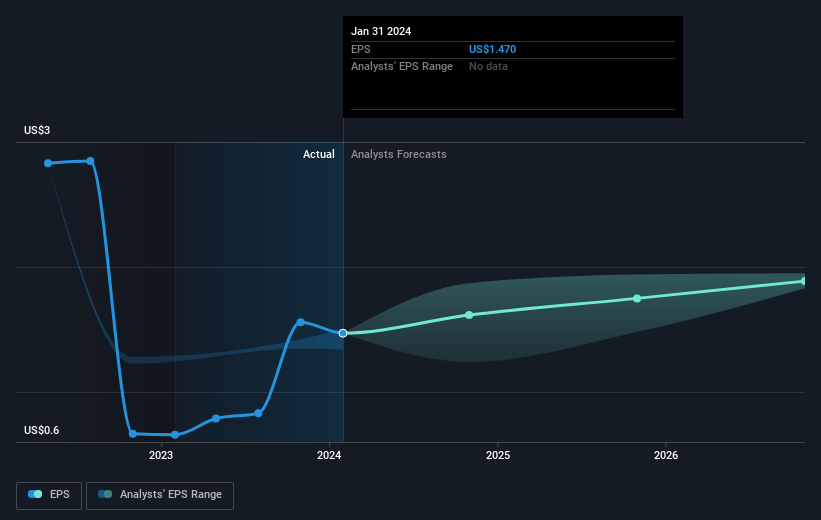- United States
- /
- Tech Hardware
- /
- NYSE:HPE
The 26% return delivered to Hewlett Packard Enterprise's (NYSE:HPE) shareholders actually lagged YoY earnings growth

On average, over time, stock markets tend to rise higher. This makes investing attractive. But not every stock you buy will perform as well as the overall market. Unfortunately for shareholders, while the Hewlett Packard Enterprise Company (NYSE:HPE) share price is up 22% in the last year, that falls short of the market return. However, the longer term returns haven't been so impressive, with the stock up just 9.6% in the last three years.
On the back of a solid 7-day performance, let's check what role the company's fundamentals have played in driving long term shareholder returns.
Check out our latest analysis for Hewlett Packard Enterprise
While markets are a powerful pricing mechanism, share prices reflect investor sentiment, not just underlying business performance. One imperfect but simple way to consider how the market perception of a company has shifted is to compare the change in the earnings per share (EPS) with the share price movement.
During the last year Hewlett Packard Enterprise grew its earnings per share (EPS) by 124%. This EPS growth is significantly higher than the 22% increase in the share price. So it seems like the market has cooled on Hewlett Packard Enterprise, despite the growth. Interesting. This cautious sentiment is reflected in its (fairly low) P/E ratio of 11.69.
The graphic below depicts how EPS has changed over time (unveil the exact values by clicking on the image).

We know that Hewlett Packard Enterprise has improved its bottom line lately, but is it going to grow revenue? Check if analysts think Hewlett Packard Enterprise will grow revenue in the future.
What About Dividends?
As well as measuring the share price return, investors should also consider the total shareholder return (TSR). The TSR incorporates the value of any spin-offs or discounted capital raisings, along with any dividends, based on the assumption that the dividends are reinvested. So for companies that pay a generous dividend, the TSR is often a lot higher than the share price return. As it happens, Hewlett Packard Enterprise's TSR for the last 1 year was 26%, which exceeds the share price return mentioned earlier. The dividends paid by the company have thusly boosted the total shareholder return.
A Different Perspective
Hewlett Packard Enterprise shareholders have received returns of 26% over twelve months (even including dividends), which isn't far from the general market return. That gain looks pretty satisfying, and it is even better than the five-year TSR of 7% per year. It is possible that management foresight will bring growth well into the future, even if the share price slows down. I find it very interesting to look at share price over the long term as a proxy for business performance. But to truly gain insight, we need to consider other information, too. Consider risks, for instance. Every company has them, and we've spotted 3 warning signs for Hewlett Packard Enterprise you should know about.
Of course Hewlett Packard Enterprise may not be the best stock to buy. So you may wish to see this free collection of growth stocks.
Please note, the market returns quoted in this article reflect the market weighted average returns of stocks that currently trade on American exchanges.
Valuation is complex, but we're here to simplify it.
Discover if Hewlett Packard Enterprise might be undervalued or overvalued with our detailed analysis, featuring fair value estimates, potential risks, dividends, insider trades, and its financial condition.
Access Free AnalysisHave feedback on this article? Concerned about the content? Get in touch with us directly. Alternatively, email editorial-team (at) simplywallst.com.
This article by Simply Wall St is general in nature. We provide commentary based on historical data and analyst forecasts only using an unbiased methodology and our articles are not intended to be financial advice. It does not constitute a recommendation to buy or sell any stock, and does not take account of your objectives, or your financial situation. We aim to bring you long-term focused analysis driven by fundamental data. Note that our analysis may not factor in the latest price-sensitive company announcements or qualitative material. Simply Wall St has no position in any stocks mentioned.
About NYSE:HPE
Hewlett Packard Enterprise
Provides solutions that allow customers to capture, analyze, and act upon data seamlessly in the Americas, Europe, the Middle East, Africa, the Asia Pacific, and Japan.
Flawless balance sheet and good value.
Similar Companies
Market Insights
Community Narratives



